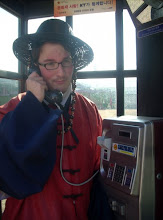
According to the traditional calendar of the Western Church, today is the Feast of Corpus Christi, or the Body of Christ. In the churches that observe this feast, there is customarily a procession in which the the Blessed Sacrament, or Eucharist is carried out of the church into the streets, while hymns and proper prayers (most of which were composed by Saint Thomas Aquinas) are offered up by the faithful following the celebrating priest who holds the Sacrament aloft in a gilt container called a monstrance. Traditionally, an embroidered canopy, like the one used in the procession from the altar to the place of repose in the Maundy Thursday Mass, is placed over the Sacrament and priest as as they process. It is a day of great festivity. Many of the medieval English Mystery Plays were composed for this occasion, including I believe, Everyman. I can remember being involved in such a procession when I was about 17. I was with group of Franciscan friars. We processed through the streets of New Bedford, our rosaries in hand, singing the ancient eucharistic hymns Tantum Ergo and and O Salutaris Hostia. Old ladies came to the side of the road bowing before what they beheld to be truly the Lord. It was one of the holiest occasions of my young life. We stopped at several station churches, and celebrated Benediction (a blessing done with the reserved Sacrament) with a priest or deacon from that parish. Like the first time I attended a Latin Mass; or indeed the first time grace led me to the doors of an Anglican church in the Catholic tradition, it was an encounter of sublime beauty. It communicated to me something of the Divine. Indeed, if I believe as my faith tells me, it did communicate the Divine. Because what it is before us is truly God.
What is the meaning of all this pageantry? Why take the Blessed Sacrament out its usual context, the reception of Holy Communion? If we adhere to a classical points of Anglicanism, there is no reason why we should. The 25th Article of Religion, in fact, explicitly prohibits such observances. It says, “ The Sacraments were not ordained of Christ to be gazed upon, or to be carried about, but that we should duly use them. And in such only as worthily receive the same, they have a wholesome effect or operation: but they that receive them unworthily, purchase to themselves damnation, as Saint Paul saith.” Well, these are pretty strong words. And indeed many English ritualists in the Victorian period came under the ire of the bishops and, even Parliament for such things. But I think that there is a great usefulness to the celebration of this feast. First of all, the Eucharist is something that we should rejoice about. So often the Eucharist can be seen as something part of routine, just part of the ritual and tradition of the Church. The celebration of Corpus Christi reminds us of the absolute holiness of the Eucharist and that it is the greatest vehicle of Grace in our common life as Christians. Also, it is a visual reminder of what we should do at all times as Christians; that is, that we should exit the doors of the church transformed by and into the Body of Christ. To quote the Eastern Orthodox theologian Alexander Schmemann, “we are what we eat.” Aside from being an opportunity for adoring Christ in the Blessed Sacrament, I think this is a very helpful way of thinking about this particular feast. I will not be able to participate in the celebration of Corpus Christ outside of the Divine Office today but I will certainly rejoice with the Church today. Truly Christ gives Himself to us in this sacrament and that is definitely something worth rejoicing.
Praise and glory to you creator Spirit of God;
you make our bread Christ's body
to heal and reconcile
and to make us the body of Christ.
You make our wine Christ's living sacrificial blood
to redeem the world.
You are truth.
You come like the wind of heaven, unseen, unbidden.
Like the dawn
you illuminate the world around us;
you grant us a new beginning every day.
You warm and comfort us.
You give us courage and fir
and strength beyond our every day resources.
Be with us Holy Spirit in all we say or think,
in all we do this and every day.
Amen. ( New Zealand Prayer Book)

No comments:
Post a Comment